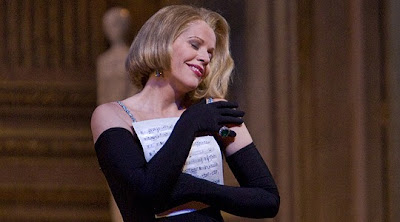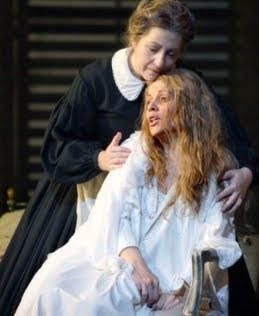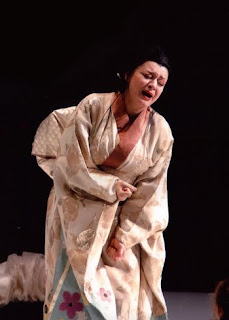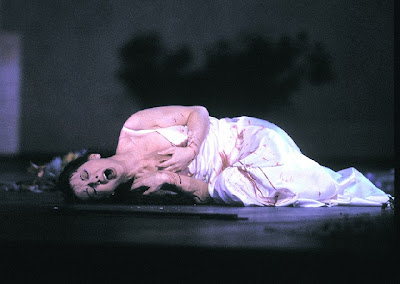It seemed only right to say a few words sull'ennesimo recital in a study of the stars over "dive" in the last two decades, the American Renee Fleming. The Fleming, although it has a soothing and mellow lyrical voice with that "little can be done" (as one would think), was launched in artistic challenges often noisy, sometimes taking off more than you can chew, sometimes hitting the mark in spite of dettrattori. What matters is that Fleming, in addition to being one of the last great divastre of our day, with all the pros and cons that this role brings with it, is a character who dares First of all artistic and all, regardless of the outcome, can not but arouse our curiosity and admiration by. After beating several territories, even seemingly far away from his abilities (his memorable Alcina, striking her Armida, to name two glaring), the Fleming seeks new horizons in the Italian verismo (very broadly indeed), with a recital all dedicated to Italian authors post-Verdi. An area in which, pressed it, the singer is starting not just uncomfortable. In truth, Fleming had already ventured in the preceding recital, in the pages of the most famous Puccini, Cilea, Catalani, Leoncavallo and so on. with satisfactory results in some cases and a bit 'less in others. This disc is implicitly promises to complete the picture. Commendable then, from a certain point of view, the absence of all tracks previously incised, mostly known to all pages, which allowed, except for a couple of songs much footage, to dig and find pages that would normally be difficult to hear in a CD of arias. An opportunity then to re-evaluate and rediscover a certain repertoire, Puccini removed the titles and a few other exceptions, it is often overlooked and, rightly or wrongly as the case, underestimated.

We arrive at the performance itself. The Fleming as has been said already appears uncomfortable and for various reasons. The first is purely voice: his book is not suited to roles as "driven" and struggles to stand up naturally warps so dense orchestral. She 's the first to admit it in the promotional video of the album, where he speaks of as Tosca and Butterfly roles off-limits to his voice. To stay on Puccini's other roles, however, appear to be unrelated, is a problem for the projection of the phrase in the lyrical moments, and for a little accent declaimed passages, albeit ill suited to a timbre, as well as psychological distance. The air from La Rondine works quite and light weight (like the concert at the end of the disc), less good is his Manon - photo - (Sola lost abandoned presented in a new version that combines the promotional functional purpose, since the air seems to have a different instrument that suits the singer's vocal quality), which seems to lack the urgency and drama of an accent and burning desperate. Even less well then the pieces are from La Boheme and Suor Angelica, pages in which Fleming is not convincing and does not bring anything new except a decent performance and a nice tone. The pure and poignant character is probably too far away from her for psychological sensitivity to vocal color, and the result is obvious. The Puccini piece where Fleming has something to say is really the last air Liu, needless to say, with realism in the strict sense has nothing to do anything now. Liu Fleming is not a story of Mimi, a character is crystallized in his pain, his resignation is a bit 'the archetype of suffering for the sake of cancellation brought to extreme conditions of life itself, a carnalissima "anti-Turandot" that, instead of defense against otherworldly feelings rising to a degree, take the path of total abandonment and aware. The color of the Fleming voice, especially in the airy initial suffering is often transformed into a surreal but vibrant, where a fabulous Renée wallows nicely. Writing then is now different from Butterfly and co. and from this it takes advantage of the Fleming. Without this exception Puccini is his frankly forgettable as well, more or less for the same reasons, its Mascagni (a bit 'better Lodoletta Iris, for reasons purely weather).

With Leoncavallo, however, things are decidedly better. In the past, the Fleming had often sung live (and recorded) the air of birds from "I Pagliacci", technically difficult piece in which he had been shown to handle it because, in addition to a technical ferratissima, a part of the liquidity inherent with this song that went to a wedding. Mimi is now deeply involved in leoncavalliana, more frivolous character of otherness Puccini-ego, a sort of synthesis of Mimi and Musetta opera composer of Lucca, a character in the role of which may still not brilliant, but at least is more credible. The real surprise is the ten-minute scene from Zaza, that it does not hide Fleming to be his favorite song on this record and, ultimately, the main dish. The scene is very suggestive, Zaza, a soubrette of café-concert, he discovers that his lover is married with a daughter, and finds out just knowing and talking with the child (in the work - actually an operetta - a role starred). It 'actually the key scene of all the drama, which focuses on a character by the complex psychology, poised between the torments of star-like Tosca (singer she too, though of a different class), the internalized pain of Cio Cio San (she also betrayed by a man already married), and especially embodiment of the dichotomy between artistic life and private life in itself already eviscerated by Leoncavallo Pagliacci. A character that Fleming can do to express his and with a loving lick hours, now nervous, now full of pain and underlying sensuality of a corrupt, fallen, expression of feelings as devastating as ever explicit. A character that could probably also do well theatrically. How not to underestimate the relationship between Fleming and music by Cilea, composer more "crop" and less than exteriorizing Puccini and Mascagni, the elegant and lyrical writing that is more suited to the American singer. If you have other disks in the same dall'Adriana had been some interest, even the air by a confirmation of the posive Gloria, where the melodic line can be soft and dynamics valuable. Glissando quickly on the page Catalani, of little musical interest / interpretation (Well I will go away because it lacks the appeal has already been registered in the past) as well as outside the context of historical and cultural that would animate the disc. Just as important is the little piece of Zandonai by Conchita, Carmen sort of proto-decadent sauce in which Fleming seems not to recognize.

last surprise of this disc so much of the tunes are alternately Jordan. On paper it would be hard pressed to associate the music of Renée Fleming Jordan, and probably beyond the American singer of these songs would not be able to be so effective in the interpretation of a complete work, again because of a voice and a sensitivity to her foreign . But Fleming, at least in these extracts, hits the mark. To begin with results amazing retrieves a page as beautiful as from Siberia, from the dreamy lyricism and suspended (in which the singer gives a display of remarkable velvety mezzevoci), full of fascinating slave that refer in some way to areas more familiar to American soprano (see above Onegin and Rusalka). Then re-read key neo-romantic in the final scene of Fedora, more heroin wrapped in the chill of the East. A page that has historically been the subject of the grossest degradation of the realist style in derogatory sense (sobbing, recited, screamed, gasped and almost never sung), and here is given to an intimate and fragile compound that can be met within the infinitely more credible in expressing the loss of a life that goes off in the bitter cold of remorse. The part is entirely sung, in a faint voice, with a faded color and sound that wobbly, like a candle in the wind in which burns yet the last memory of a sensuality and a passion devoid of any force and the vain, however, a reading that makes a kind of new to Fedora Violetta - photo - closing the circle of "realism" in the history of opera. Final Judgement: a whole disc with many ups and downs and not fully convincing, certainly not the best recital of the American soprano. A disc that can be appreciated, however, want to rediscover some pages out of footage, you want to hit some readings that add other small pieces to the mosaic art of Renée Fleming, who for better or for worse is still able to find inspiration for her stimulating opening same as an artist and for those of us who listens and continues to admire the will to experiment and try to speak, with music, something new.
Renée Fleming - Verismo
(Decca 2009)
1) Puccini - "No Mamma" from Suor Angelica
2) Mascagni - "A little girl was in" from Iris
3) Puccini - "sweet and divine Hours" from La Rondine with Kaoru Saito, Lucia Mencaroni, Barbara Vignudelli
4) Mascagni - "Ah, his name Flammen forgive me ..." from Lodoletta
5) Catalani - "It never, therefore, I will have peace ... Alas!" From La Wally
6) Puccini - "It My name is Mimi from La Bohème
7) Leoncavallo - "Musette flips on Vocca alive" from La Bohème
8) Leoncavallo - "Mimi Pinson biondinetta the" from La Bohème Cautoruccio with Paul, Mark Calabrese, Kaoru Saito, Annalisa Dessi, Carlos Gomez, Gilles Armani and Choir
9) Puccini - "Addio ... Donde pleased" from La Bohème with Arturo Chacón-Cruz
10) Leoncavallo - "Angel, your name?" From Zaza Emma with Latis
11) Puccini - "Sola lost Abandonia" from Manon Lescaut
12) Zandonai - "Yesterday's Factory" from Conchita
13) Chile - "O my cun Bloom "from Gloria
14) Jordan -" All set "from Fedora with Arturo Chacón-Cruz and Emma Latis
15) Puccini - "You who gel boundary" from Turandot with Arturo Chacón-Cruz, Marco Calabrese, Barbara Vignudelli, Choir
16 ) Jordan - "In the know love" from Siberia
17) Puccini - "I drink your fresh smile" from La Rondine with Jonas Kaufmann, Barbara Vignudelli, Paul Cauteruccio and Choir
2) Mascagni - "A little girl was in" from Iris
3) Puccini - "sweet and divine Hours" from La Rondine with Kaoru Saito, Lucia Mencaroni, Barbara Vignudelli
4) Mascagni - "Ah, his name Flammen forgive me ..." from Lodoletta
5) Catalani - "It never, therefore, I will have peace ... Alas!" From La Wally
6) Puccini - "It My name is Mimi from La Bohème
7) Leoncavallo - "Musette flips on Vocca alive" from La Bohème
8) Leoncavallo - "Mimi Pinson biondinetta the" from La Bohème Cautoruccio with Paul, Mark Calabrese, Kaoru Saito, Annalisa Dessi, Carlos Gomez, Gilles Armani and Choir
9) Puccini - "Addio ... Donde pleased" from La Bohème with Arturo Chacón-Cruz
10) Leoncavallo - "Angel, your name?" From Zaza Emma with Latis
11) Puccini - "Sola lost Abandonia" from Manon Lescaut
12) Zandonai - "Yesterday's Factory" from Conchita
13) Chile - "O my cun Bloom "from Gloria
14) Jordan -" All set "from Fedora with Arturo Chacón-Cruz and Emma Latis
15) Puccini - "You who gel boundary" from Turandot with Arturo Chacón-Cruz, Marco Calabrese, Barbara Vignudelli, Choir
16 ) Jordan - "In the know love" from Siberia
17) Puccini - "I drink your fresh smile" from La Rondine with Jonas Kaufmann, Barbara Vignudelli, Paul Cauteruccio and Choir














